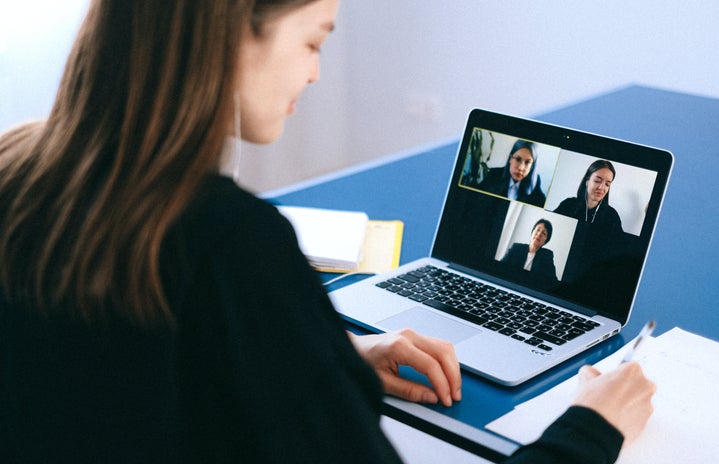Warning- the terminology may be triggering/upsetting for those battling dysmorphia or other anxiety/body image related conditions. Please proceed with mindfulness and look after yourself.
We have all heard of Zoom, especially so in the light of the COVID-19 Pandemic. We have had to do university classes, social gatherings, and more, over online platforms. Surprisingly, Zoom had been around for a long time before this. Ever since its inception in 2011, Zoom has brought online video meetings and phone calls to many. However, it is only in recent times that we have linked this global platform to a ‘new’ type of Dysmorphia.
We encounter some sensitivity and must proceed with caution when we use the term ‘Dysmorphia’. As a serious mental health condition, ‘Dysmorphia’ is better known as BDD, or body dysmorphic disorder. This condition affects a wide variety of people’s lives, and can bear a strong significance on an individual’s daily life. The NHS website provides a wealth of information if you are interested/in need of some help regarding BDD. This article, however, is in no way a psychological or scientific approach. It should also not be used as a resource to receive help for Dysmorphia. Instead, we will focus more on the way the pandemic has affected our self-image in general.
Psychology Today lists the main signs of ‘Zoom Dysmorphia’ as:
“Anxiety about attending video meetings with your camera on
Attempting to look perfect before video calls
Focusing on your on-screen appearance and finding flaws
Believing that others are focused on your perceived flaws”
For some, these four signs are very descriptive of what it is like to be hyper-focussed on the image they are portraying over Zoom.
In pre-pandemic life, we placed more emphasis on what outfits we would wear when going to in-person classes, rather than the way our faces look (at least this was the case for me). Whereas, during the pandemic, a greater focus was drawn to the face rather than to clothes as this was the only thing others were seeing. In a very superficial fashion, if one is focussed on clothing, there is a clear way to remedy their discomfort. Buy new clothes. However, with our faces, this is a much more difficult feat. One cannot simply buy a new face. So, we are left with an impossible situation.
Some have been lead to plastic surgery to alleviate the anxiety and dislike they have over their appearance. Livingstone from the BBC reported that ‘phone inquiries for neck and face work’ have risen 57% in the past year according to Save Face, a Welsh based cosmetic treatment agency. Livingstone speculates that this is due to body image issues in the wake of Zoom calls and online meetings. It is indeed true that there is a distinctive ‘want’ and for some, a ‘need’ to look perfect when on camera.
I think partly to blame for this are blockbuster movies. A strange claim, I know, but the fact that our main exposure to ‘video’ is through highly edited and stylised videography; this is severely misleading and troublesome. When an average user is in a Zoom meeting, what can be at the back (or front) of their mind, is the self-hatred as to why they do not look ‘right’. Again, this is impossible to remedy. When asking a friend (who shall remain nameless) whether they experienced Zoom Dysmorphia in the height of the pandemic- their response was: ‘No, it was all about the lighting and angles.’ Another stated that their Zoom has a built-in beauty filter. Is it the fact that they felt the need to find the ‘correct’ angle and lighting or apply the ‘built-in beauty filter’ that hints towards some dissatisfaction with their body image being portrayed over Zoom?
The biggest issue with Zoom in regard to body image, is that we see our image reflected back to us the whole time. In non-pandemic times, going to class never requires you to be confronted with the image of your face at all. And so, for many, the way they look (facially) is never on their minds. Yet, when in a Zoom meeting, it is easy to find oneself looking inconspicuously at one’s own image whilst adjusting posture and one’s smile to appear as this ‘perfect’ self that they have in their minds. This is evidently highlighting that body image and how we look to others is of great concern for many. If there is to be a change in this (and I really hope there will be), we need to confront these negative thoughts about ourselves and approach online meetings the way we do in-person meetings, with ease and with less care for how we appear.
Overall, it seems the main way that the pandemic has affected body image in the boom of Zoom use, highlights the difficulty to look ‘right’ on camera and how troubling it is to have the expectation of oneself to look ‘perfect’. When in reality, however cliché it may seem, everybody is perfect in their own way.


